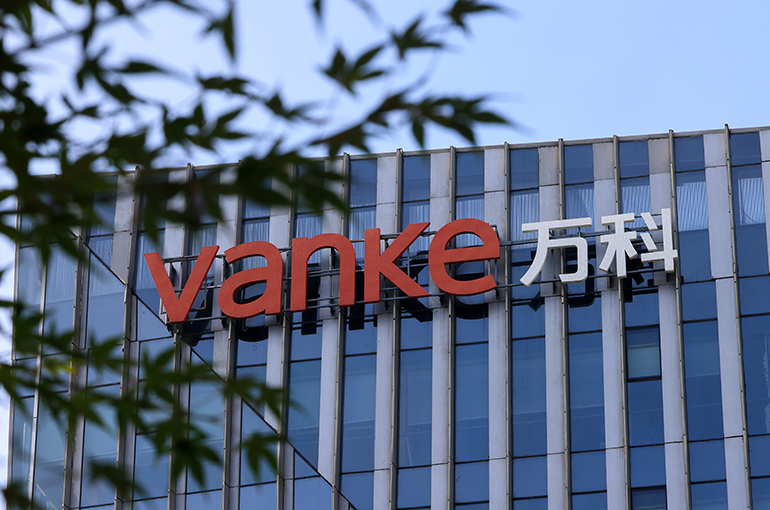 Vanke’s Stock Drops as Chinese Builder Seeks Extension to USD280 Million Onshore Bond
Vanke’s Stock Drops as Chinese Builder Seeks Extension to USD280 Million Onshore Bond(Yicai) Nov. 27 -- China Vanke's shares and some notes tumbled after the real estate developer said it proposes to seek a delay on repayment of a CNY2 billion (USD280 million) onshore bond coming due next month, a step that raises the debt-ridden company’s risk of default.
In early morning trade, Vanke’s shares [SHE: 000002; HKG: 2202] fell to their lowest in more than a decade. They finished the day down 7.1 percent at CNY5.47 (77 US cents) in Shenzhen and fell 7.2 percent to HKD3.60 (46 US cents) in Hong Kong. The slide has accelerated in recent days as worries mount over the firm’s ability to meet its debt obligations.
Vanke will hold a bondholders' meeting on Dec. 10 to consider extending the bond, 22 Vanke MTN004, which will fall due on Dec. 15, the Shenzhen-based company announced through the Shanghai clearing house late yesterday. It carries an annual interest rate of 3 percent.
This is the first time that Vanke has sought to extend repaying the principal on a yuan bond. The company may default on the debt if the proposal is rejected.
22 Vanke MTN004’s price tumbled more than 30 percent before the Shenzhen exchange suspended its trading earlier today. Trading in several of the developer’s other notes was likewise halted after they reached the daily limit on price swings.
Vanke’s proposal sends an important signal that its state-owned controlling shareholder may no longer be able to provide a last-resort financial backstop for its repayments, making a debt restructuring highly likely, a Chinese rating agency insider told Yicai.
The move suggests that major shareholder Shenzhen Metro Group may may no longer lend to Vanke to help the builder meet its obligations, instead allowing the company to deal with its debt through market-based means and its own resources, said Liu Shui, corporate research director at China Index Academy, a leading property market think tank.
Vanke’s options for addressing its liabilities will mainly include maturity extensions, asset disposals, refinancing, and debt-to-equity swaps, Liu added.
Even if bondholders approve the extension before maturity, avoiding a technical default, the move would still dent the firm’s creditworthiness, as it would sap confidence among institutional investors in Vanke’s ability to service its debt and hamper its access to future financing, Liu noted.
Most property developers that have sought bond extensions in recent years have eventually defaulted, Liu pointed out.
As of Sept. 30, Vanke had repaid CNY28.9 billion in onshore and offshore bonds this year. The firm has another medium-term note of CNY3.7 billion coming due at the end of December, along with about CNY12.4 billion in local bonds maturing next year. It also has roughly CNY7 billion in offshore bonds and more than CNY3 billion in yuan bonds falling due in 2027.
Under severe liquidity strain, Vanke has depended on loans from Shenzhen Metro to fund bond principal and interest payments. Shenzhen Metro has extended nearly CNY30.8 billion in unsecured loans to the developer so far this year.
As those loans have reached the upper limit Shenzhen Metro committed to earlier this year, Vanke must now provide collateral for them. If it fails to do so, Shenzhen Metro reserves the right to demand early repayment of both principal and interest, the developer said last week.
Despite this support, Vanke’s earnings shows no sign of recovery. Its net loss widened 56 percent to CNY28 billion in the first three quarters from a year earlier, with the third-quarter loss nearly doubling to CNY16.1 billion, according to the company’s latest financial report.
Operating revenue dropped 27 percent to CNY161.4 billion (USD22.6 billion) in the nine months ended Sept. 30 from a year ago, the lowest since 2018. Third-quarter income also fell 27 percent to CNY56.1 billion.
Editors: Tang Shihua, Futura Costaglione